Back then, we didn’t know we were living. “Back then” was the first eight or so years of the 21st Century - not forever ago at all. Yet now it feels like not so much a foreign country as more like a different universe. Because back then, there was a buzz. Everything was on the move. It was Action Stations All Areas. It wasn’t a case of “Is it permissible under Government Regulations?” or “Can we do it?” It was more a matter of “When will we do it?” and “How soon will we do it?”
We may now have the makings of a Road Map out of the Covid-19 paralysis, but all the roads in it are long, and some are very winding indeed. As each stage is reached, it will be day-to-day pilotage rather than visionary navigation. And of course, its implementation will all depend on the scourge receding according to the hopeful scientific expectations.
How different it was back then, back when everything was a matter of just get up and go. Of course, there were some crazy episodes. One year, for instance, Ireland had something like three teams racing in the Commodore’s Cup. And they were racing against each other with such determination that there were absurd inter-Ireland protests.
So inevitably we didn’t finally win the Commodore’s Cup until 2010 with its ferocious economic downturn, with a very sober cost-effectively-planned recession-aware single team, put together with infinite patience by Anthony O’Leary and ICRA. But the recession was so deep that there was no defence in 2012, and while the same O’Leary determination won the Commodore’s back in 2014, there was a sense of it being a satisfactory way to end an era, but an unmistakable ending nevertheless.
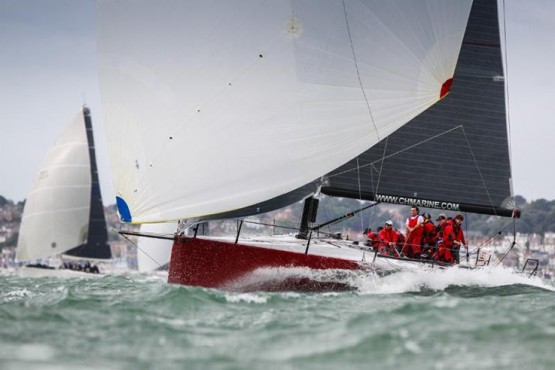 “The Red Antix” - Anthony O’Leary’s Ker 40 Antix was RORC “Yacht of the Year” and led Ireland to victory in the 2014 Commodore’s Cup in an outstanding success that marked the end of an era. Photo courtesy RCYC
“The Red Antix” - Anthony O’Leary’s Ker 40 Antix was RORC “Yacht of the Year” and led Ireland to victory in the 2014 Commodore’s Cup in an outstanding success that marked the end of an era. Photo courtesy RCYC
Yet in looking back to those early years of this now uncertain Century in which we are living with increasing difficulty, there are boats and successes which stand out, boats and achievements which seem to have endured some special test of time.
Everyone will have their own favourite superstar boats, and if we scratch about in the memory bin, others will emerge. But for me the first three that spring to mind are George Radley’s Holland 39 Imp and Eric Lisson’s Granada 38 Cavatina – both from Cork - and Ger O’Rourke’s Cookson 50 Chieftain from Kilrush.
Of course, there were other outstanding boats, such as the O’Leary family’s Antix in the white and silver and red versions. Yet there was something mainstream and extremely sensible about the superb O’Leary campaigns, whereas the wild card element is unmistakable in the doings of Chieftain and Imp and Cavatina.
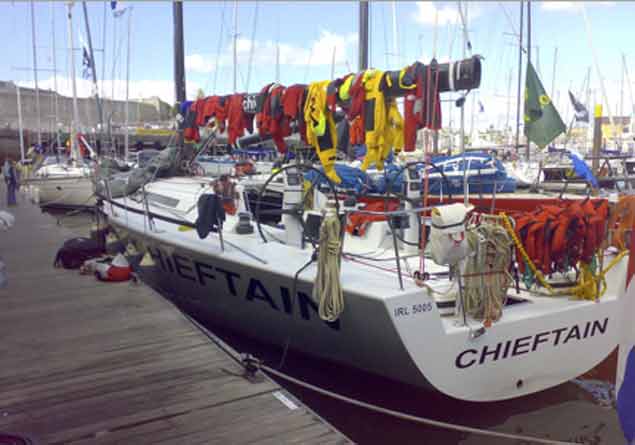 Drying out process….Chieftain in Plymouth after the Rolex Fastnet Race 2007. Photo: Ger O’Rourke
Drying out process….Chieftain in Plymouth after the Rolex Fastnet Race 2007. Photo: Ger O’Rourke
We focused on Chieftain a couple of weeks ago in highlighting her outstanding overall win in the 2007 Fastnet Race to round out an extraordinary global programme, a programme which had seen her win her class and come fourth overall in the 2005 Sydney-Hobart Race, and then place second in the 2007 New York to Hamburg Transatlantic race before going on to sweep the board in the Fastnet of that same year.
That was a sometimes chaotic gale-swept race which was already out of kilter at the start. The RORC fleet was still becoming accustomed to having the Fastnet start on the Sunday at the end of Cowes Week instead of the time-honoured Saturday, yet in 2007 a sudden gale saw its further postponement to the Monday 13th August, so it was right into the next weekend by the time most of the greatly-reduced fleet finished. And though Chieftain had finished late on the Thursday evening to take the win, the exhausted skipper had his work cut out getting his crew kitted out in clean white shirts for the prize-giving on the Friday.
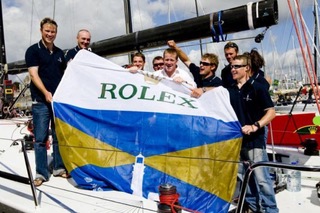 Magic moment – Chieftain’s crew – with Ger O’Rourke at centre – after they’d been told in Plymouth they were overall winners of the Rolex Fasten Race 2007. Photo courtesy Ger O’Rourke
Magic moment – Chieftain’s crew – with Ger O’Rourke at centre – after they’d been told in Plymouth they were overall winners of the Rolex Fasten Race 2007. Photo courtesy Ger O’Rourke
Ger has been through the mill more than somewhat since, as he had the misfortune to break his back in a kite-surfing accident in South Africa and spent a year out of action mending up after open-spine surgery. But he was in a fine nostalgic form when phoning out of Lockdown the other day, and sent on some photos of that Day of Days in Plymouth and the full names of his diverse international crew, who were Ger O’Rourke (IRL) skipper, Jochem Visser (NED) navigator, Dee O’Rourke (IRL) pit, Edwin O’Connor (IRL) Trim, Ryan Houston (NZ) Drive, Cam Marshall (NZ) Bow, Matthew Stuart (NZ) Trim, Tom Whelan (IRL) Trim, Robert Gullan (UK) Mid-bow, Donie Hegarty (IRL) Trim, Kevin Johnson (IRL) Trim, and Tom Whitburn (UK) Pit.
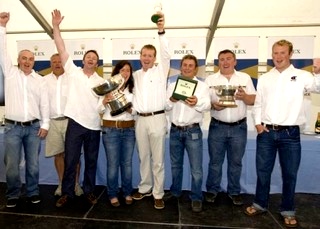 New white shirts all round – crewmember Dee O’Rourke and her skipper father Ger in the middle of Cheftain’s crew at the Rolex 2007 Fastnet Prizegiving
New white shirts all round – crewmember Dee O’Rourke and her skipper father Ger in the middle of Cheftain’s crew at the Rolex 2007 Fastnet Prizegiving
International they may be, but Ger’s roots in Limerick are so strong that he even has a link to the Limerick ketch Ilen, as Gary Mac Mahon of Ilen reckons it was he who introduced the hyper-energetic young Ger O’Rourke to sailing. Back in the 1980s, Willie Sexton’s bar on Henry Street in Limerick was where all the movers and shakers met on a Thursday night, and Gary mentioned in Sexton’s during a typical early-summer Thursday night that the following evening he was off to do a weekend boat delivery under sail, and Ger O’Rourke overheard that and said that he’d be interested in giving this sailing a try for the first time and…….well, history can take it from there.
In the case of Imp, the wild card recognition is because anything to do with George Radley and boats has a streak of wild card brilliance about it. George is a cradle sailor, yet his approach to sailing is sui generis, and the rest of the world can only wonder at what he’ll do next.
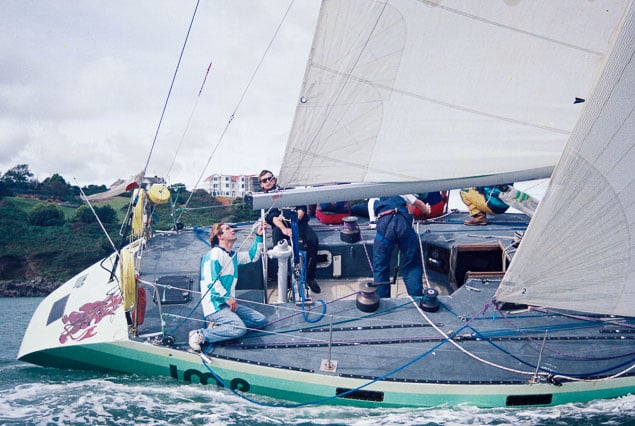 Doing it his way. George Radley at the helm of Imp Photo: Bob Bateman
Doing it his way. George Radley at the helm of Imp Photo: Bob Bateman
But in the case of Cavatina, the wild card is found firstly in the reality that although there were maybe about three dozen Granada 38s built between 1979 and 1983, Cavatina seems to be the only one which has been consistently campaigned offshore under the IRC rule, and she has been doing it with great success since before the turn of the Century.
In fact, her rating has seemed so favourable that when RORC measurer Mike Urwin was at Cork Week one year, he was asked to run the tapes over Cavatina to find out what was the secret ingredient. He reported back that there was no secret ingredient, she just happened to fit the rule very neatly, and maybe the secret ingredient was that her crew happened to sail Cavatina very well in offshore races of adult length.
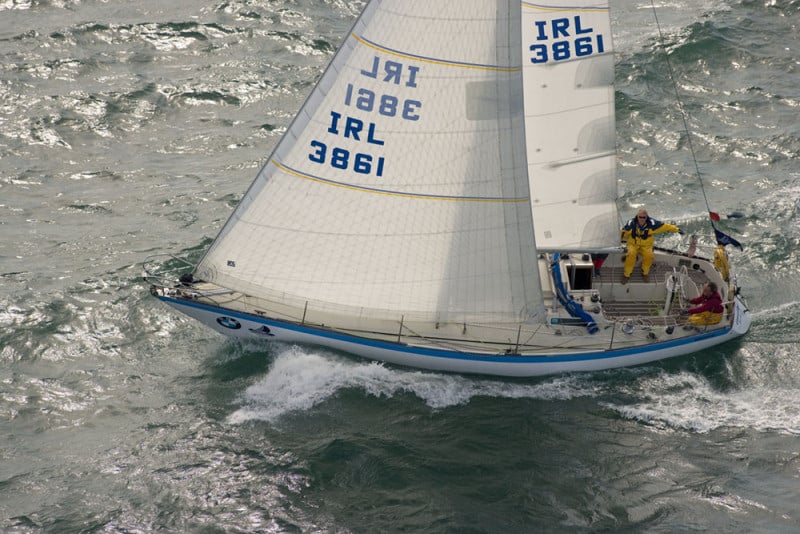 A very normal-looking superstar….Eric Lisson’s Cavatina on her way to winning the Round Ireland Race 2006. Photo: Round Ireland/David Branigan
A very normal-looking superstar….Eric Lisson’s Cavatina on her way to winning the Round Ireland Race 2006. Photo: Round Ireland/David Branigan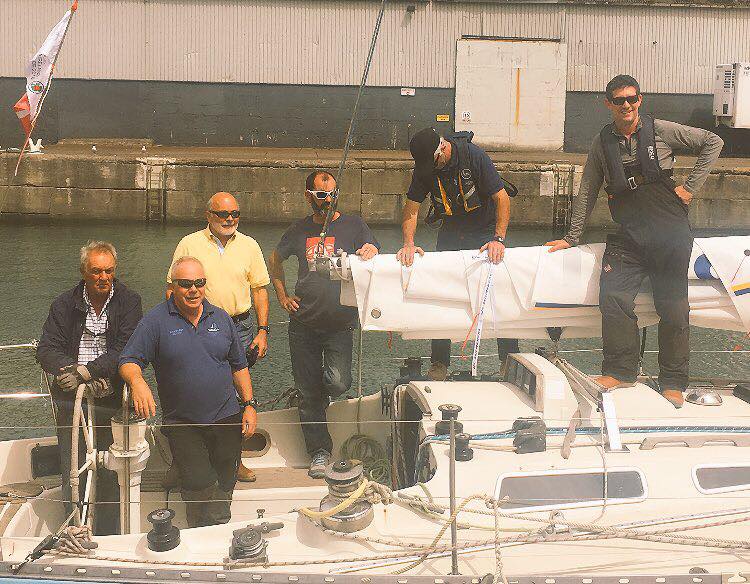 Boat and crew as one – the Cavatina team in Wicklow, scene of some of their major successes
Boat and crew as one – the Cavatina team in Wicklow, scene of some of their major successes
There’s probably a doctoral thesis to be written about Cavatina and her crew, who seem to have remained remarkably consistent in their makeup over the years under the ownership first of Eric Lisson, and more recently of Ian Hickey. Boat and crew, they know each other inside out, such that in any set of circumstances everyone will know what sail combination should be set in order to maximize performance, and they can often seem to communicate this knowledge through a sort of telepathy.
Thus they’re always seen as a threat by others in the Round Ireland Race when they’ve come from behind more than once to take the overall win, they’ve had at least two excellent Fastnets with second overall in 2005’s race and their class win in 2007 when Chieftain took the top prize, and before that in the same year, Eric Lisson and Dave Hennessy brought Cavatina the two-handed division and overall win in the Azores & Back Race.
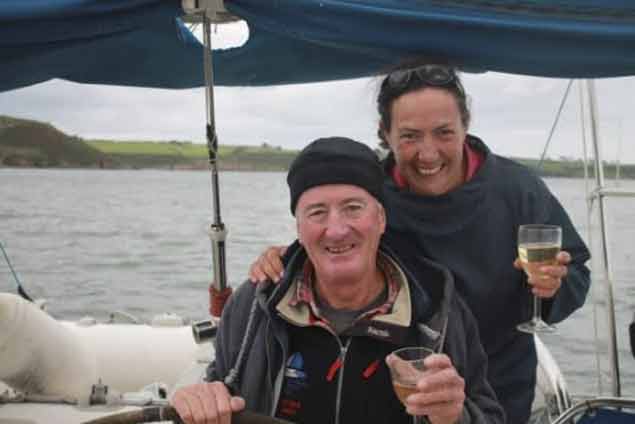 Global circumnavigators – Dave Hennessy and his wife Katrina Emtage on Laragh
Global circumnavigators – Dave Hennessy and his wife Katrina Emtage on Laragh
Dave has also logged a four-year global circumnavigation with the 1989-built Jeanneau Sun Magic 44 Laragh with his wife Katrina Emtage between 2013 and 2016, and they’ve been back to northwest Spain and the Azores since. On top of that, in shore life he’s a renowned melodeon player on the traditional music scene in Cork and beyond. In fact, he seems to achieve so much that you feel inclined to enquire of your usually reliable Cork sources if they’re sure we’re talking about one and the same Dave Hennessy around boats and music, and they’ll enigmatically reply they’ve often wondered the same themselves, but it seems he is just the one person, and here he is with melodeon and friends on YouTube
Meanwhile, we look at the Covid-19 Exit Programme, and wonder why - as the Government has taken such extensive powers to itself - they didn’t simply de-commission today’s Bank Holiday, and keep it in reserve for deployment at a time when people like those who sail Imp and Cavatina can make better use of it…































































